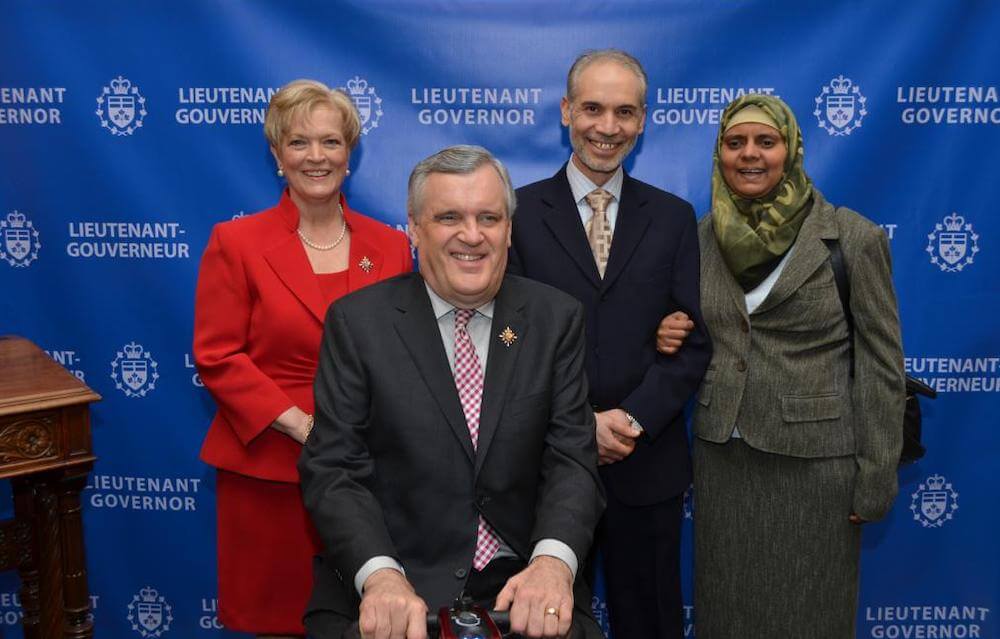A personal tribute to David Onley, Former Lieutenant Governor of Ontario
The disability community is in shock over the passing of David Onley, Former Lieutenant Governor of Ontario, recently deceased at the age of 72. He was a shining star in the disability community and beyond.
Most people knew him only on television. Many of us heard him speak before his appointment, raising awareness about the abilities of people with disabilities — a rare voice championing our potential. Some of us got to know him more when he became Lieutenant Governor of Ontario and brought grassroots communities to official events in the Ontario legislature — a place so inaccessible to so many of us for so many reasons.
As a hijjabi, brown, blind woman — as the world sees me, in whatever order — Queen’s Park was a place of privilege where I did not belong and had never been invited until Mr. Onley’s appointment. And yes, the advice and support of a white male with a disability was important for breaking barriers for me, and others. If people in positions of power don’t make space for racialized people with disabilities, unfortunately, our abilities alone won’t get us in the door.
Mr. Onley helped open up that space.
I first got to know Mr. Onley through my sister, Uzma Khan, who served as vice-chair of the Accessibility Standards Advisory Council of Ontario which Mr. Onley chaired. In 2007, we as people with disabilities, were filled with hope and optimism when he was appointed as Ontario’s 28th Lieutenant Governor.
Genuine and approachable, Mr. Onley graciously accepted my invitation to speak at the Canadian Association of Muslims with Disabilities Planning for the Future Disability Rights and Responsibilities Symposium in 2009 in Mississauga. We were prepped for all the formalities that went along with the protocols of hosting the Queen’s representative. When Mr. Onley arrived, hundreds of people stood to greet him, and he took his time meeting everyone in the gymnasium of the Islamic Society of North America (ISNA) Canada Centre.
So humble and warm, he touched the hearts of many people with disabilities and their families.
We continued to have many conversations about intersectionality, understanding the lived experiences of racialized people with disabilities, the importance of culturally and spiritually responsive services and so much more. He appreciated the role of faith in the lives of people with disabilities as he was a devout Christian.
In June of 2013, he generously hosted a round table in his suite at Queen’s Park for me where I presented my Master’s research, Portraits of Muslims with Intellectual Disabilities and Their Families Living in Ontario, which then helped establish the DEEN (Disability Empowerment Equality Network) Support Services, and our flagship centre, known as the Muneeba Centre in Mississauga.
Mr. Onley identified me as his advisor on cultural sensitivity and disability. I considered him a mentor. He was always there to support and advise me and my community work.
One of the most invaluable pieces of advice he gave me in recent years was to build relationships with newly elected officials at various levels of government to raise awareness about the issues that I was promoting. He understood that disability is a cross-partisan issue and that it takes everyone to work together and build a welcoming community.
I had the privilege of presenting him with our Accessibility Champion Award in 2014 at DEEN’s Fundraising dinner where everything that could go wrong, did go wrong, with the sound system. He spoke eloquently and passionately about the inclusion of people with disabilities in all aspects of our society — despite the technological barriers that evening.
From heartfelt recommendation letters and sincere advice, David Onley was indeed a friend and disability rights champion who encouraged and supported me and so many others working in the disability community. In fact, he nominated my sister and I for the Queen’s Diamond Jubilee Medal presented to us by former Chief Justice Roy McMurtry at Roy Thomson Hall in 2012.
He was familiar with the pioneering work of Ethnoracial People with Disabilities Coalition of Ontario, (ERDCO), and appreciated the need to establish a national alliance as a voice for racialized people with disabilities taking shape as Race and Disability Canada.
When I took on the role of National Director of Disability Without Poverty (DWP), he signed-on to the open letter calling on the federal government to fast-track the Canada Disability Benefit bill, attended our webinars and incorporated thoughts from our personal conversations into his lectures at University of Toronto Scarborough.
I most recently spoke to him over the phone before the holidays when he told me about the renovations winding down at their home, which Mr. and Mrs. Onley decided to invest in as a result of the pandemic. They wanted to age at home because they were concerned about what happened to so many of our seniors in long-term care.
He was grateful that he had choice as a person with a disability and felt strongly that it was time to end disability poverty.
Sir, your friendship and contributions will always be remembered with admiration and gratitude.
You helped build a movement, an enriching community, and made Ontario and Canada a more welcoming place for disabled people. We will all do our best to honour your legacy through the kinds of service and action that you taught us so well.
Photo courtesy of the author




